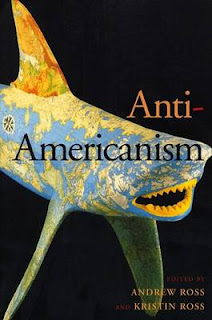Where I, Ron, blog on a variety of different subjects--social theoretical, historical, cultural, political, social ethical, the media, and so on (I got the Max Weber, the Mark Twain, and the Stephen Leacock in me)--in a sometimes Niebuhrian or ironic way all with an attitude. Enjoy. Disagree. Be very afraid particularly if you have a socially and culturally constructed irrational fear of anything over 140 characters.
Wednesday, 18 April 2018
The Books of My Life: Anti-Americanism
Once upon a time I was a Biblical Studies major. I was less interested in the theology or dogma surrounding the Bible, however, than its history and its prehistorical and historical contexts. Little did I know when I switched from Biblical Studies to the social sciences that I would still be reading theological and doctrinal works and dealing, in my teaching, with theology and dogma on a fairly regular basis in my history and history of television classes.
Several years back I read Hungarian born sociologist Paul Hollander's book Anti-Americanism: Critiques at Home and Abroad, 1965-1990, published by the American arm of the venerable Oxford University Press in 1992. Hollander's book proved less an analysis of anti-Americanism than a dogmatic and doctrinal study of, what Hollander called, irrational anti-modernism and irrational anti-capitalism. In Hollander's world, anti-Americans weren't reacting to what imperial America did. They were irrationally reacting to what America was, modern and capitalist, and were thus a primitive throwback to an earlier period of world history. Needless to say Hollander's book is part of the same ahistorical fabric as the contention of American demagogues that America's enemies hate it not for its policies and global actions, but for its "freedoms" and "liberties", things that are, for demagogic purposes, suitably ideological and emotional so that the masses can be easily manipulated by demagogic rhetoric.
Recently I read another book on anti-Americanism, Andrew Ross's and Kristen Ross's edited collection Anti-Americanism published by NYU Press in 2004. Ross's and Ross's collection, which originated out of a conference held in February of 2003, is everything Hollander's book isn't. It is, in other words, less theological, less doctrinal, and more empirical and historical. I found a number of the essays in Ross's and Ross's collection interesting and enlightening. Historian Greg Grandin's essay helpfully typologises various forms of anti-Americanism. Kristen Ross's essay explores elite and more popular forms of anti-Americanisms in France. Timothy Mitchell's essay on anti-Americanism in the Middle East is particularly enlightening on how the United States has used war and radical Islamist groups to try to gain imperial traction in the Middle East and to try to stave off socialism in the Middle East. Mary Nolan's essay explores the history of post-war German anti-Americanism. John Kuo Wei Chen's essay explores elite America's use of the claim of anti-Americanism to demonise the "other". Linda Gordon's essay explores the iron cage of anti-Americanism that America's conservative apologetic and polemical elite and intellectuals have caged liberals and the left in. All of these essays show what should be obvious to any dispassionate observer, that the vast majority of forms of anti-Americanism are a rational response to post Spanish-American war imperialism.
Personally, I have long seen anti-Americanism as similar to something I researched for several years, the claim among intellectual Mormons that all criticism of Mormonism was and is grounded in stereotypes and caricatures of Mormons. It is true that some varieties of anti-Mormonism are grounded in stereotypes and caricatures. Evangelical Ed Decker's various attacks on Mormonism, most notably his attacks on Mormons and Mormonism in The God Makers, is filled with an irrational hatred of Mormons and the Mormon faith. The Tanner's many tomes on Mormonism are also problematic given that they apply methods to the analysis of Mormonism that they would not apply to their own evangelicalism because the results would be the same. There are, however, also valid criticisms of Mormonism. One can readily, for example, argue, on empirical and historical grounds, that the Book of Mormon provides the answer to virtually every quandary in 19th century American religion and so is probably a product of 19th century America. This latter is simply not anti-Mormonism, though you don't have to be Michel Foucault to understand why Mormon apologists and polemicists might want to categorise it as such or to understand why America's elite and their polemical and apologetic courtier intellectuals, like Paul Hollander, might want to categorise any criticism of America as irrational and backward and demonise it.
Subscribe to:
Post Comments (Atom)

No comments:
Post a Comment